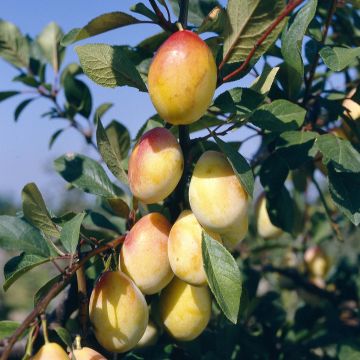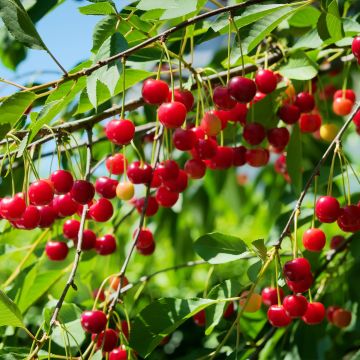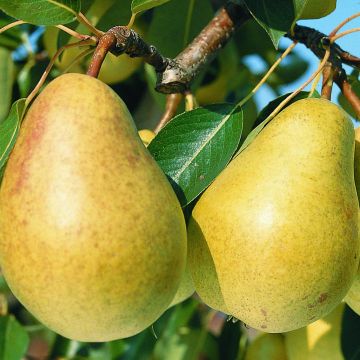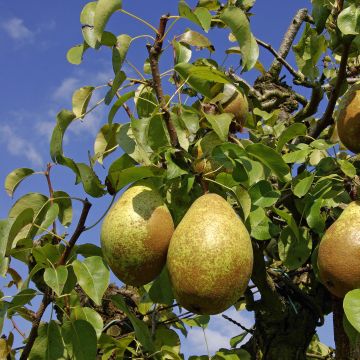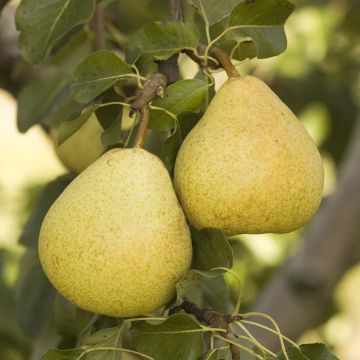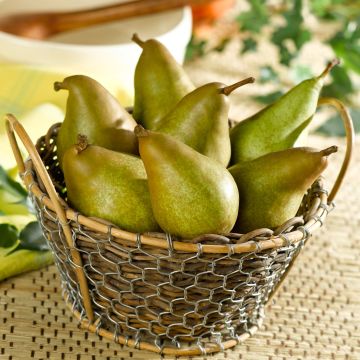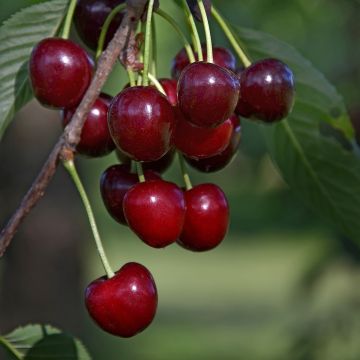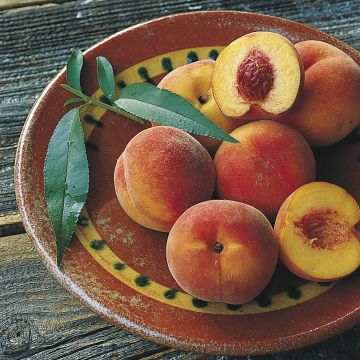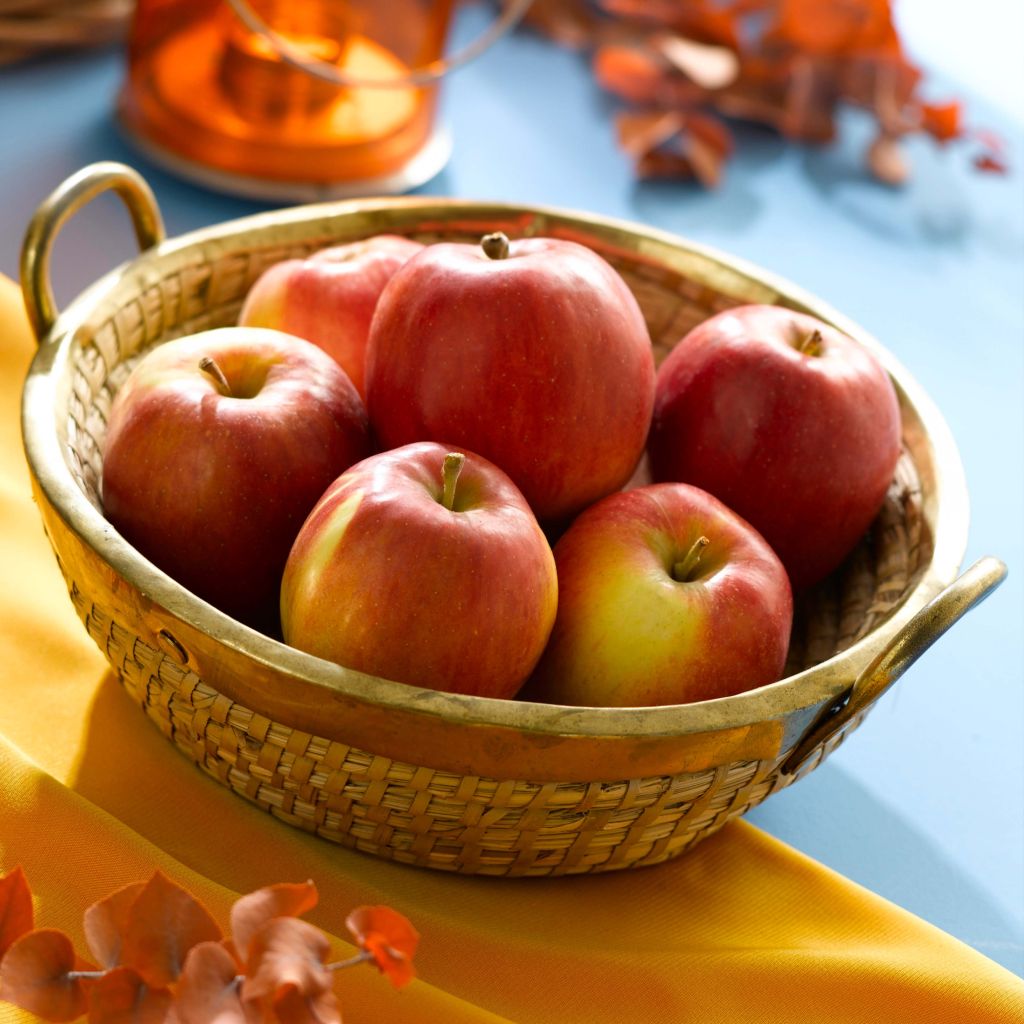

Apple Tree Harmonie - Malus domestica
Apple Tree Harmonie - Malus domestica
Malus domestica Harmonie® 'Delorina'
Apple, Orchard apple, Table apple, Cultivated apple
Bonjour, Ce pommier n'a pas survécu, le bois tout sec, très déçu.
Evelyne, 01/05/2023
Special offer!
Receive a €20 voucher for any order over €90 (excluding delivery costs, credit notes, and plastic-free options)!
1- Add your favorite plants to your cart.
2- Once you have reached €90, confirm your order (you can even choose the delivery date!).
3- As soon as your order is shipped, you will receive an email containing your voucher code, valid for 3 months (90 days).
Your voucher is unique and can only be used once, for any order with a minimum value of €20, excluding delivery costs.
Can be combined with other current offers, non-divisible and non-refundable.
Home or relay delivery (depending on size and destination)
Schedule delivery date,
and select date in basket
This plant carries a 6 months recovery warranty
More information
We guarantee the quality of our plants for a full growing cycle, and will replace at our expense any plant that fails to recover under normal climatic and planting conditions.
Description
Malus domestica Hamonie ('Delorina') is a vigorous and productive variety that bears delicious fruits that are slightly elongated and ribbed. Their red and golden yellow skin has a pleasant fragrance, emitting a scent that combines notes of hazelnut and banana. Their flesh is pleasantly sweet, crisp, and quite juicy.
Malus domestica belongs to the Rosaceae family. It is cultivated almost everywhere in the world and includes countless varieties, both ancient and modern, that produce apples of varying sizes and flavours, ranging from sweet to tart. Apple trees are native to Europe. They are hardy, with some varieties able to withstand temperatures as low as -30°C (-22°F).
Apple tree leaves are deciduous and arranged alternately on the branches. Their lamina is oval and toothed. They have a dark green upper surface and a whitish, slightly fuzzy lower surface. In spring, it bears white or pinkish-white flowers grouped in corymbs. Apple tree flowers have 5 petals and surround a core composed of about 20 stamens. They give rise to fleshy fruits (drupe-like from a botanical perspective) that are spherical and filled with pips. The colour, size, flavour, and shelf life of the apples vary depending on the variety. Apple trees are rarely self-fertile, so require the presence of other apple trees that bloom at the same time and in close proximity to bear fruit.
Harmonie is harvested in mid-October. This fruit tree produces an excellent medium-sized apple that is equally delicious eaten raw or cooked. It also has the advantage of storing well, lasting until February and even longer if stored under optimal conditions. This apple tree is not self-fertile, so it should be planted near other varieties that bloom at the same time, such as Regali or Delbard Jubilé.
Harmonie is hardy, withstanding temperatures down to -20°C (-4°F). It typically flowers in early May. It is a disease-resistant variety with rapid and regular fruiting.
Domestic apple trees rarelly exceed 10m (33ft) in height and almost the same in width. The size may be much smaller depending on the vigour of the rootstock used. This fruit tree generally has a high trunk that naturally spreads out. It comes in various forms (bush, half-standard, standard) and can be trained in various ways (column, cordon, espalier).
For transport reasons, our tallest scions may be pruned before shipping. They are suitable for all common training systems: cordons, espaliers, bushes, half-standards, and low standards. They are not suitable for high standards. Please contact us if you would like more information or advice on training your fruit trees.
This fruit tree is delivered in a "ready-to-plant" rootball. During planting, the rootball should be planted as it is. The biodegradable tontine that surrounds the rootball and preserves the rootlets will decompose naturally during the plant's growth. By doing so, you ensure better establishment.
Report an error about the product description
Apple Tree Harmonie - Malus domestica in pictures
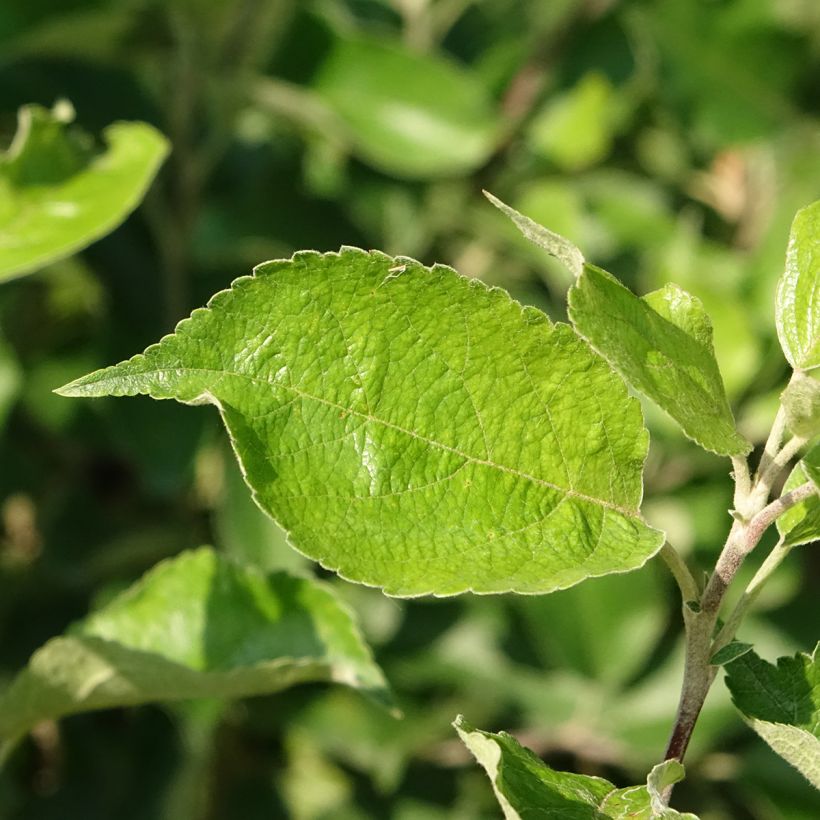

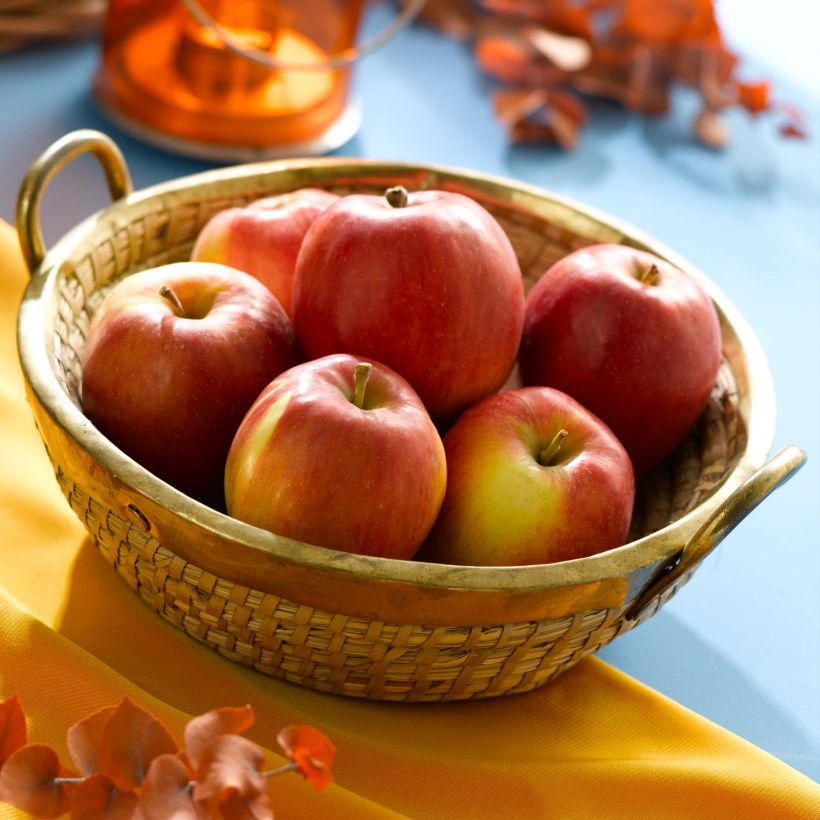

Plant habit
Fruit
Flowering
Foliage
Botanical data
Malus
domestica
Harmonie® 'Delorina'
Rosaceae
Apple, Orchard apple, Table apple, Cultivated apple
Cultivar or hybrid
M106 (Ready-to-plant root ball - Goblet)
Planting and care
Choose a sunny location for your apple tree. The soil can be slightly chalky or acidic, but not excessively so. Dig a wide planting hole at least 3 times the volume of the root ball. Simultaneously add organic matter (topsoil, compost) and a base fertiliser. Do not bury the graft collar. Stake if necessary. Water abundantly, even in winter and even if it rains. Fruit trees are ideally planted between October and March, outside of the freezing period. Container-grown plants can be planted all year round, except during periods of extreme heat or frost.
During winter, you can add a small handful of wood ash, which is rich in potash. This will improve fruiting.
Watch out for possible aphid attacks during the season. A white powdery coating due to powdery mildew may appear on the leaves in summer, but it does not harm fruit development in gardens.
During the harvest, only keep the picked fruits. Store the apples on shelves or in crates with their stem facing downwards. Choose a preferably completely dark, dry and cool place that is frost-free.
Planting period
Intended location
Care
-
, onOrder confirmed
Reply from on Promesse de fleurs
Similar products
Haven't found what you were looking for?
Hardiness is the lowest winter temperature a plant can endure without suffering serious damage or even dying. However, hardiness is affected by location (a sheltered area, such as a patio), protection (winter cover) and soil type (hardiness is improved by well-drained soil).

Photo Sharing Terms & Conditions
In order to encourage gardeners to interact and share their experiences, Promesse de fleurs offers various media enabling content to be uploaded onto its Site - in particular via the ‘Photo sharing’ module.
The User agrees to refrain from:
- Posting any content that is illegal, prejudicial, insulting, racist, inciteful to hatred, revisionist, contrary to public decency, that infringes on privacy or on the privacy rights of third parties, in particular the publicity rights of persons and goods, intellectual property rights, or the right to privacy.
- Submitting content on behalf of a third party;
- Impersonate the identity of a third party and/or publish any personal information about a third party;
In general, the User undertakes to refrain from any unethical behaviour.
All Content (in particular text, comments, files, images, photos, videos, creative works, etc.), which may be subject to property or intellectual property rights, image or other private rights, shall remain the property of the User, subject to the limited rights granted by the terms of the licence granted by Promesse de fleurs as stated below. Users are at liberty to publish or not to publish such Content on the Site, notably via the ‘Photo Sharing’ facility, and accept that this Content shall be made public and freely accessible, notably on the Internet.
Users further acknowledge, undertake to have ,and guarantee that they hold all necessary rights and permissions to publish such material on the Site, in particular with regard to the legislation in force pertaining to any privacy, property, intellectual property, image, or contractual rights, or rights of any other nature. By publishing such Content on the Site, Users acknowledge accepting full liability as publishers of the Content within the meaning of the law, and grant Promesse de fleurs, free of charge, an inclusive, worldwide licence for the said Content for the entire duration of its publication, including all reproduction, representation, up/downloading, displaying, performing, transmission, and storage rights.
Users also grant permission for their name to be linked to the Content and accept that this link may not always be made available.
By engaging in posting material, Users consent to their Content becoming automatically accessible on the Internet, in particular on other sites and/or blogs and/or web pages of the Promesse de fleurs site, including in particular social pages and the Promesse de fleurs catalogue.
Users may secure the removal of entrusted content free of charge by issuing a simple request via our contact form.
The flowering period indicated on our website applies to countries and regions located in USDA zone 8 (France, the United Kingdom, Ireland, the Netherlands, etc.)
It will vary according to where you live:
- In zones 9 to 10 (Italy, Spain, Greece, etc.), flowering will occur about 2 to 4 weeks earlier.
- In zones 6 to 7 (Germany, Poland, Slovenia, and lower mountainous regions), flowering will be delayed by 2 to 3 weeks.
- In zone 5 (Central Europe, Scandinavia), blooming will be delayed by 3 to 5 weeks.
In temperate climates, pruning of spring-flowering shrubs (forsythia, spireas, etc.) should be done just after flowering.
Pruning of summer-flowering shrubs (Indian Lilac, Perovskia, etc.) can be done in winter or spring.
In cold regions as well as with frost-sensitive plants, avoid pruning too early when severe frosts may still occur.
The planting period indicated on our website applies to countries and regions located in USDA zone 8 (France, United Kingdom, Ireland, Netherlands).
It will vary according to where you live:
- In Mediterranean zones (Marseille, Madrid, Milan, etc.), autumn and winter are the best planting periods.
- In continental zones (Strasbourg, Munich, Vienna, etc.), delay planting by 2 to 3 weeks in spring and bring it forward by 2 to 4 weeks in autumn.
- In mountainous regions (the Alps, Pyrenees, Carpathians, etc.), it is best to plant in late spring (May-June) or late summer (August-September).
The harvesting period indicated on our website applies to countries and regions in USDA zone 8 (France, England, Ireland, the Netherlands).
In colder areas (Scandinavia, Poland, Austria...) fruit and vegetable harvests are likely to be delayed by 3-4 weeks.
In warmer areas (Italy, Spain, Greece, etc.), harvesting will probably take place earlier, depending on weather conditions.
The sowing periods indicated on our website apply to countries and regions within USDA Zone 8 (France, UK, Ireland, Netherlands).
In colder areas (Scandinavia, Poland, Austria...), delay any outdoor sowing by 3-4 weeks, or sow under glass.
In warmer climes (Italy, Spain, Greece, etc.), bring outdoor sowing forward by a few weeks.































